733 years ago today, the Republic of Venice passed a law confining the city’s growing glassmaking industry to the island of Murano, giving birth to the tradition of Murano glass, one of the city’s most iconic characteristics. In the following century, exports began, and the island became famous, initially for glass beads and mirrors. Aventurine glass was invented on the island, and for a while Murano was the main producer of glass in Europe. Today, it’s a craft that is entering the fine art world. READ more about this fabulous skill… (1291)
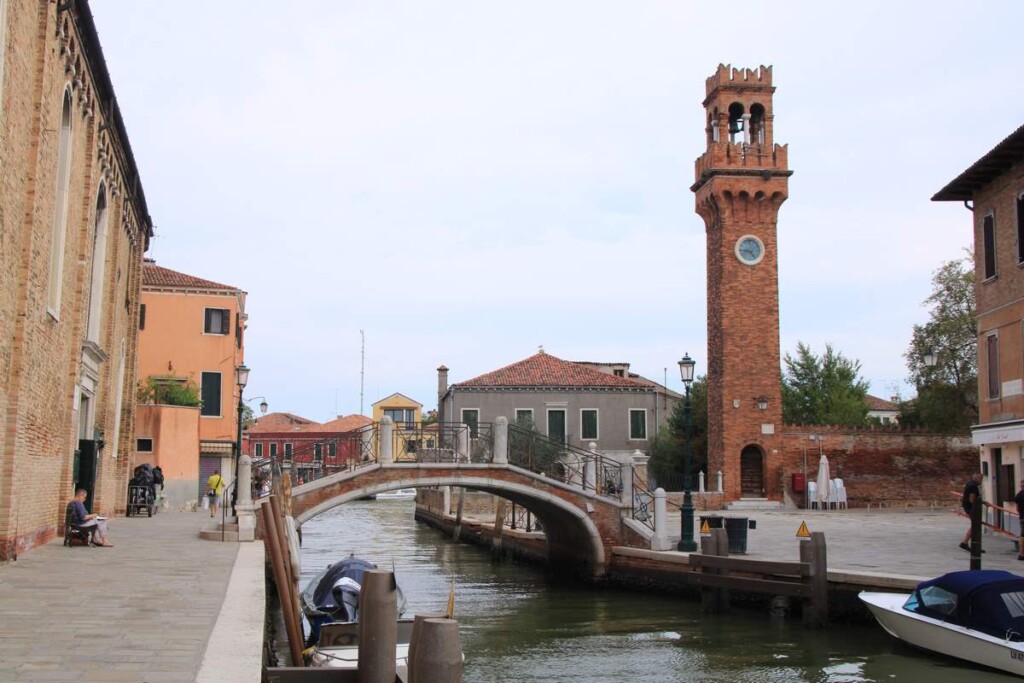 The island of Murano © Andrew Corbley
The island of Murano © Andrew CorbleyFrom practical items like cups, bowls, lamps, and chandeliers, Murano artisans gradually began turning from applied art to fine art, with chandeliers becoming works of sculpture, and works of sculpture becoming masterpieces.
While the glass itself is delicate and dainty, a Murano glass artisan must be physically durable and resilient. Once he or she starts a piece, they cannot stop until it’s finished even if that means 16 hours of work. Neither the artisan, nor the glass can be allowed to cool down too much from the incredible heat of the furnaces, otherwise, the molten glass won’t be shapable anymore.
 The glassmakers of Murano © Andrew Corbley
The glassmakers of Murano © Andrew Corbley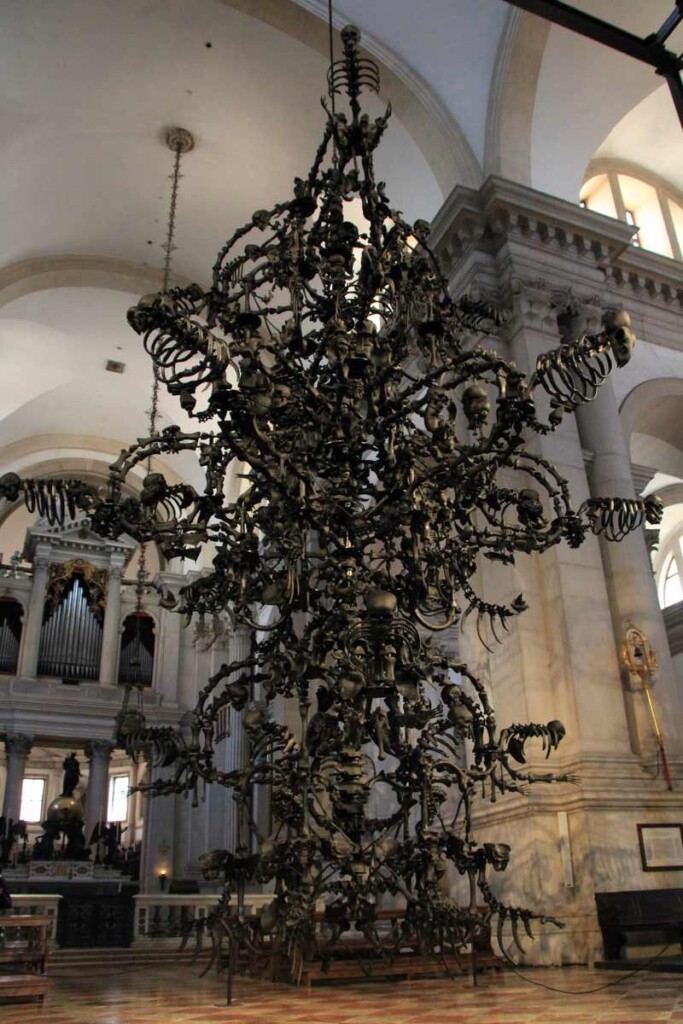 A giant sculpture piece made of cast Murano glass. © Andrew Corbley
A giant sculpture piece made of cast Murano glass. © Andrew CorbleyMurano glass artwork is now a more sensible business model for these artisans, as the high cost they merit is more flexible and can absorb higher energy prices in Europe as natural gas is needed to heat the furnaces. Glass artisan Adriano Berengo from Studio Berengo has put on several exhibits of glass art made in collaboration with famous Chinese artist Ai Wei Wei, such as the massive chandelier of bones made of blackened, cast modeling of Murano glass—the largest sculpture in the history of the artform.
More Good News on this Date:
422 years ago today, the Bodleian Library was re-opened (permanently) at Oxford University. It’s the main research library of the University of Oxford, and is one of the oldest libraries in Europe. It derives its name from its founder, Sir Thomas Bodley. With over 13 million printed items, it is the second-largest library in Britain after the British Library.
 The Bodleian Library CC 3.0. SA Ozeye
The Bodleian Library CC 3.0. SA OzeyeThomas Bodley wrote in 1598 “where there hath bin hertofore a publike library in Oxford: which you know is apparent by the rome it self remayning, and by your statute records I will take the charge and cost upon me, to reduce it again to his former use.” Six of the Oxford University dons were tasked with helping Bodley in refitting the library in March 1598, and the library was refitted with Bodley donating some of his own books to furnish it.
Among the treasures of the Library include many of J.R.R. Tolkien’s manuscripts, as he was a professor at the university. One of the four copies of the Magna Carta can be found there, as well as one of the 21 first-edition Guttenberg Bibles, the letters of Percy Shelley, and the original Song of Roland.
There’s also the Vernon Manuscript, the longest and most important surviving manuscript written in Middle English, the oldest extant written text of ancient Indian mathematics, Shakespeare’s first Folio, and the Gough Map, the oldest medieval map of Great Britain. (1602)
Also on this day, in 1966, Edward Brooke became the first African-American elected to the US Senate. A former Attorney General of Massachusetts, the local Republican won a historic landslide in a Democratic state that had a black population of just 2 percent–and was reelected for a second term.
Raised in a Washington, DC middle-class family, he enlisted and became an Army officer after the bombing of Pearl Harbor. Then, with a law degree from Boston U., he first ran for Congress at 29. He authored a book in 2006, Bridging the Divide: My Life, before dying at age 95, in 2015.
And, 64 years ago today, John F. Kennedy won the election for president of the United States, defeating Richard Nixon in one of the closest elections of the 20th century—decided by an average of one vote per precinct nationwide.
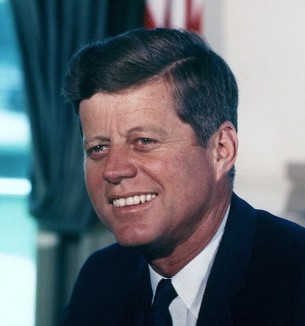 The World War II Navy veteran was the only president to have won a Pulitzer Prize. His book, Profiles in Courage, written while he was a US senator from Massachusetts, featured inspiring true accounts of eight unsung heroic acts by American patriots. It became required reading for students. JFK’s high school classmates were not wrong when they voted him Most Likely to Succeed. He became the youngest president to be elected in history at 43 years old.
The World War II Navy veteran was the only president to have won a Pulitzer Prize. His book, Profiles in Courage, written while he was a US senator from Massachusetts, featured inspiring true accounts of eight unsung heroic acts by American patriots. It became required reading for students. JFK’s high school classmates were not wrong when they voted him Most Likely to Succeed. He became the youngest president to be elected in history at 43 years old.
In his inaugural address, he spoke of the need for all Americans to be active citizens, famously saying, “Ask not what your country can do for you. Ask what you can do for your country.” Check out other quotes from his speech below… (1960)
Let us never negotiate out of fear. But let us never fear to negotiate.
And, Happy Birthday to Bonnie Raitt who turns 75 years old today.
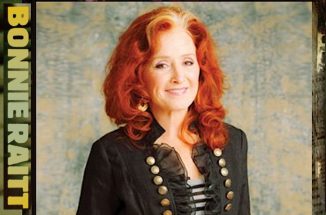
The much-admired blues singer-songwriter and slide guitarist scored a No.1 album with Nick Of Time which won three Grammy Awards, including Album of the Year. She still tours, most recently performing at Willie Nelson’s Outlaw Music Festivals.
The redhead with the sultry voice and ‘69 Stratocaster is an 11-time Grammy winner, and Rolling Stone named her to both their Top 100 guitar players and Top 100 singers of all time. WATCH a performance of her first hit, Thing Called Love at her Rock Hall of Fame Induction accompanied by Bruce Hornsby and Melissa Etheridge (1949)
53 years ago today, Led Zeppelin released their iconic fourth album with its hit, Stairway to Heaven—the sixth-highest-selling LP in US history at 23× Platinum.
It was recorded in an English country house with an informal setting that inspired the band, said guitarist Jimmy Page, who produced the album: “The sort of facilities where we could have a cup of tea and wander around the garden.”
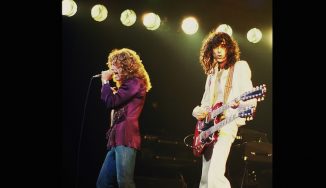 1977 by Jim Summaria, CC license
1977 by Jim Summaria, CC licenseUntitled, it was only represented by four symbols chosen by each band member.
They were told their decision to release the LP with no written information was akin to “professional suicide”, but the group stood their ground and refused to hand over master tapes until their decision was approved. It rose to No.1 on the UK chart within days and stayed there for 90 weeks.
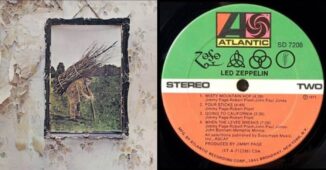
A huge success, it was the group’s best-selling record, shipping over 37 million copies worldwide—and placing highly on most lists of greatest albums of all time.
WATCH a cool video on the making of the album—and read some neat trivia about the best tracks… (1971)
• Known generally as Led Zeppelin IV, the 19th-century rustic oil painting on the front cover was purchased from an antique shop by singer Robert Plant.
• Black Dog was named after a pup that was always hanging around the country home called Headley Grange.
• Page used a mandolin on The Battle of Evermore, and it was the first time he played the instrument. Plant added lyrics inspired by a book he was reading about the Scottish Independence Wars.
• The Stairway to Heaven lyrics—about a woman who “took everything without giving anything back”— were written by Plant, who did some of his best songwriting while at Headley Grange.
• The quiet acoustic number, Going to California, was written by Page and Plant about Californian earthquakes, and trying to find the perfect woman, while the music was inspired by Joni Mitchell, a California resident whom they both admired.
• The lyrics to Misty Mountain Hop, also written at Headley Grange by Plant, was about dealing with the clash between students and police over drug possession, with its title coming from J. R. R. Tolkien’s The Hobbit.
SHARE The Milestones, Memories, and Music…
Source link


